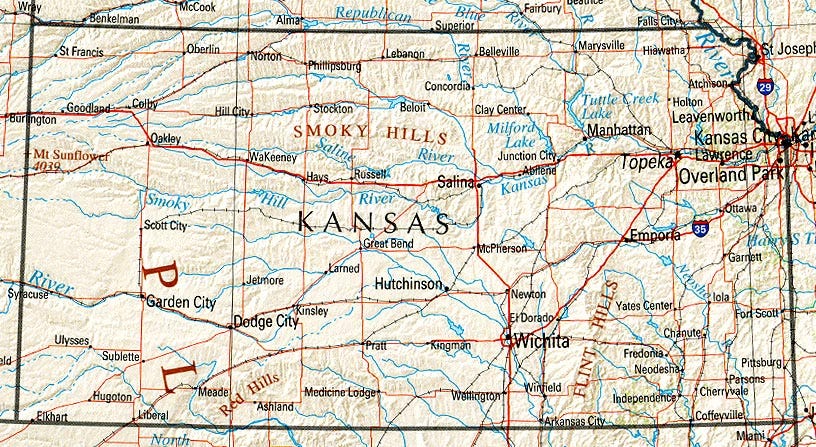How to Get from There to Here

Lewis, Kansas was 10 minutes straight east; Greensburg (home of the world’s largest hand-dug well) 28 minutes south. Offerle, a few low buildings huddling around grain elevators, 10 minutes west. Go 29 minutes more to Dodge City, and you could eat McNuggets and fries at the McDonald’s with a table inside a mock covered wagon. Head northeast for just under an hour and you find yourself in Great Bend, named after the behavior of the Arkansas (pronounced AR-Kansas) river.
These were lovely drives, long-legged and straight as a well-snapped chalk line. I had driven them so frequently — to movies, basketball games, school, roller-skating parties, late-night truck-stop breakfasts — that they induced a meditative state where the mind forgets to worry about the body and begins to run out on its own.
One of the best things about these drives was the alignment between distance and time, where one mile equaled one minute, no less pleasing for being arbitrary. I would meet few other cars or trucks, certainly not enough to disrupt the equation. Usually there was more sky than anything and, if I was lucky, a whiff of skunk or smear of coyote sprinting across the highway.
I particularly loved to drive alone at night in the Midwest, loved how the land, rubbed smooth and flat by an ancient glacier, became a seabed for an ocean of dark. How sparse towns offered a few optimistic lights every now and then. How things at night would lose their edges, including my own self, suddenly as big as the car and no different from it. I loved to feel swallowed. Small. At the end of this time, these miles that were minutes, was the bed that I dreamed in, where I replayed and repackaged the world, made it a little more mine, until I followed the road away forever.
These memories of driving when I was younger arrive these days as I ride the subway in New York, a good 30 years out from owning a car. Why now? Why do I want to tell you this? Perhaps it’s as Louise Glück writes:
I lived in the present, which was
that part of the future you could see.
The past floated above my head,
like the sun and moon, visible but never reachable.
Which gets me to thinking about the way headlights reveal just an oncoming bit of a long road and how it feels to exist in a moment that seems fixed but racing. I’m also tempted to say that remembering, or at least nostalgizing, is like driving in rural Kansas: Riding familiar roads looking for the moments of joy that pave them, times when you knew where and when you were and how far you were from home.
But a little more thought suggests otherwise. We see that each of us is something like a pile of experiences — loose, variable and variegated — and that the mind loves to uncouple duration from distance. So strange how we can fold time and space, as if any two points on the wide map of self can be made to touch.
I have never been farther from my young self; I have never been closer.

Beautiful essay. I particularly love this: " ... a meditative state where the mind forgets to worry about the body and begins to run out on its own." Is that state only available to the young? I remember it and would love to find it again, but my aging mind drifts always back to the aging body.